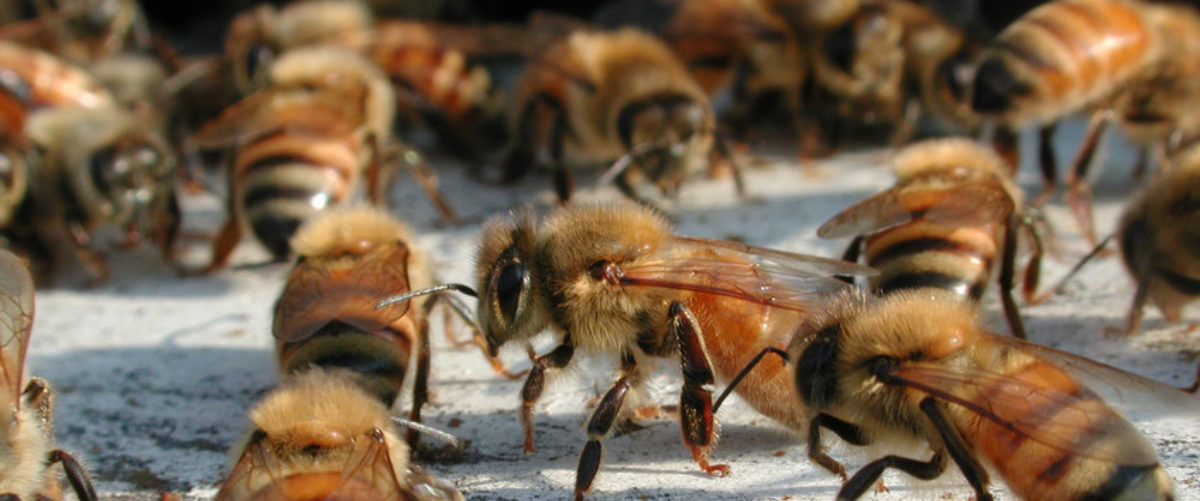The State of Delaware Apiarist
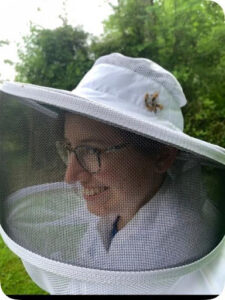
Delaware beekeepers are required to register their bees with the
State of Delaware. Registration is due annually by January 30th. Beekeepers selling or giving away bees or used equipment are required to obtain permits from the State Apiarist. Beekeepers moving bees across state lines are also required to obtain an interstate transport permits. In the case of serious pests or
diseases, the State Apiarist may declare a quarantine and order the destruction or treatment of colonies.
The State Apiarist provides education for beekeepers, including apiary inspections for every beekeeper who requests one and hands-on workshops at the state’s Teaching Apiary. The State Apiarist also investigate bee kills. If you suspect bees were harmed by pesticides, immediately contact the State Apiarist or the Pesticides Administrator. As a service for beekeepers, the State of Delaware also provides access to BeeCheck, a communication tool that allows pesticide applicators to locate apiaries and notify beekeepers before sprays. A link to BeeCheck and the registration link to register your bees with the State of Delaware can be found below.
Registration link: https://survey123.arcgis.com/share/e055e4d26b3b4b92b9d73215c77b763c
BeeCheck link: https://driftwatch.org/
A variety of fact sheets and educational videos can be found at the State of Delaware Beekeeping site: https://agriculture.delaware.gov/plant-industries/honeybees/. These videos and fact sheets cover various topics ranging from varroa mites to best practices and to information on American and European foulbrood.
The University of Delaware Bee Lab and Apiary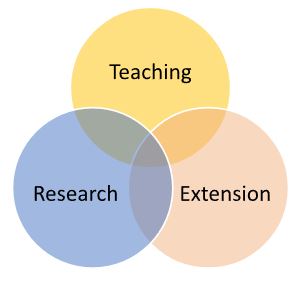
The Apiculture Program at the University of Delaware has 3 foci: research, teaching and extension, which are very interdependent. Working in these three areas allows us to incorporate basic research results into applied management practices for the public and professionals, and provides unique career developing opportunities for students.
Research and Extension
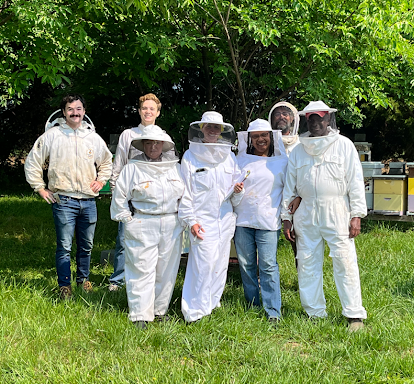
Due to the importance of honey bees in agriculture via the pollination service they provide and the marked decrease in honey bee populations over the past two decades, the science and art of beekeeping is a very sought after service. We serve the public sector through educational workshops, seminars, hands-on demonstrations, web design, consultation and grant funded research aimed at increasing the economic viability of beekeepers and land managers in the Mid-Atlantic region.
The goals and strengths of the Apiculture Program are: to understand how to manage for pollinator population stability and to effectively communicate findings to the scientific, agricultural and public communities, to use molecular techniques to understand the mechanisms for population stability across the landscape and the use of basic and applied research to mitigate a changing pollinator community that needs to meet human service requirements of pollination.
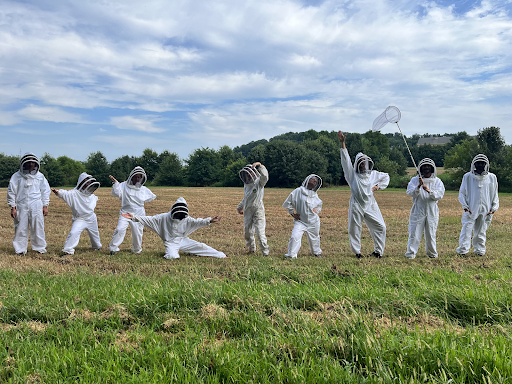
Successful fruit and vegetable production would be at risk without healthy honey bee populations. Bees are also essential for pollinating wildflowers and native trees and shrubs, which are the backbone of the state’s forests and natural areas, which yield the fruits and seeds that sustain wildlife.
UD Teaching Apiary and Pollinator Waystation
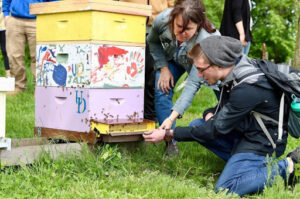
Apiculture has been a part of extension and outreach efforts at the University of Delaware since the 1940’s. There has been a functioning apiary on the campus since the 1950’s. To-date the University hosts between 100-150 colonies on Newark Farm (1 Teaching apiary, and 3 research/production yards) used for research, teaching, honey and queen production. The Teaching Apiary is used primarily for outreach to the public and to provide a hands-on learning experience for students taking Apiculture (ENWC 214).
In 2013 internal funding was used to develop a new course offering Pollination Ecology (ENWC 423). Thiscourse specifically analyzes the interaction between flowering visiting animals and flowering plants. The foci on flower and visitor morphology, behavior and physiology are not only fascinating but helps students to better explore coevolution. The goal of this course is to change the perception of what makes a landscape valuable.
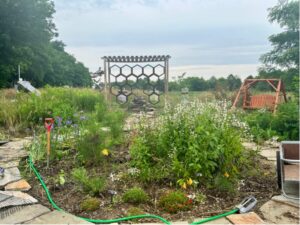
Beauty alone does not reflect ecological function. A portion of the funding was used to develop a Pollinator Waystation, designed by students to serve as an example of an ecologically valuable refuge for supporting a diversity of animals. Student’s have been involved with transitioning a swath of rocky unusable land in front of the apiary into a food pantry and nesting site for hundreds of pollinating animals.
Pollen Library and Forage Research
Since starting beekeeping in 1995 understanding the mystery of what bees were eating has been at the forefront of my queries. The first step towards answering this question began in 2015. My lab endeavored on a steep learning curve of developing a bee collected pollen library.
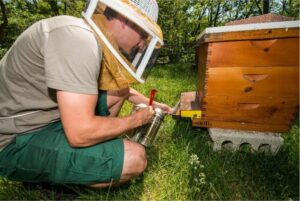
All bee visited flowers within a 3 to 6 mile radius from the University of Delaware Teaching Apiary were collected and the pollen was processed and digitally recorded. The library enabled us to more accurately identify the species of pollen our bees were bringing into their colonies. Once we had developed a robust library of known pollens we started tracking and trapping pollen collection from a subset of colonies within the apiary from March through to September. Finally we were able to understand what plants supported our colonies throughout the season.
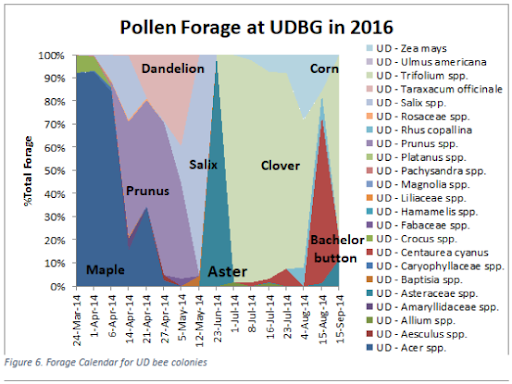
The Anther’s Promise
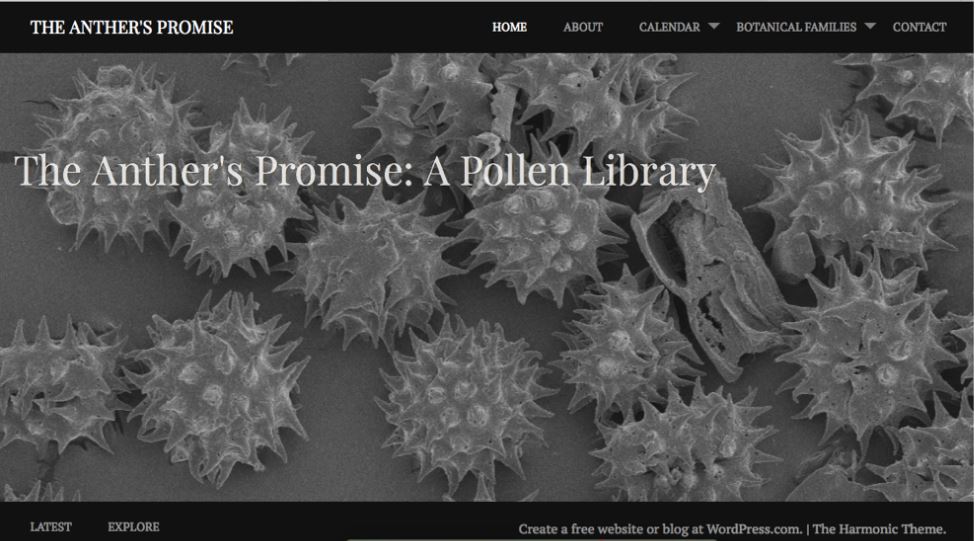
While developing the pollen library we became quickly inspired by the beauty and unique morphology of the microscopic universe of plant’s male gametes, pollen. We wanted to share the images and identification information with all beekeepers and land managers. We decided to create a website called Anther’s Promise: (a little cheesy I know, but I am that person!) https://theantherspromise.com/. I supported three amazing undergrads through various fellowships offered by the University and not only created a website showcasing bee collected pollen, instructions on how to collect and develop a library, but also tips for processing and identification.
